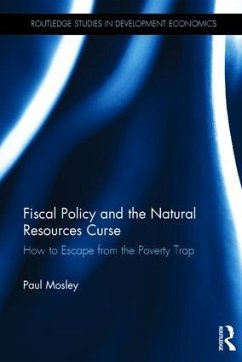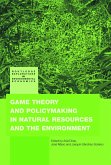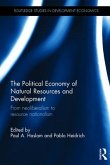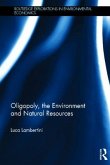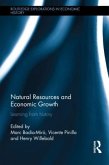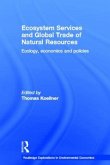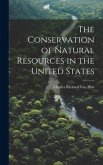- Gebundenes Buch
- Merkliste
- Auf die Merkliste
- Bewerten Bewerten
- Teilen
- Produkt teilen
- Produkterinnerung
- Produkterinnerung
Fiscal Policy and the Natural Resources Curse ask why many governments of natural resource-intensive countries are incapable, in a globalised world, of dealing with the natural-resource curse. This book offers a detailed analysis of the power-relationships which underpin the natural resource curse, using both statistical analysis and country case-studies from Africa and Latin America to pinpoint the strategies that have enable developing countries to break out of the poverty trap.
Andere Kunden interessierten sich auch für
![Curse of the Factory System Curse of the Factory System]() John FieldenCurse of the Factory System189,99 €
John FieldenCurse of the Factory System189,99 €![Game Theory and Policy Making in Natural Resources and the Environment Game Theory and Policy Making in Natural Resources and the Environment]() José Albiac / Ariel Dinar / Joaquín Sánchez-Soriano (eds.)Game Theory and Policy Making in Natural Resources and the Environment230,99 €
José Albiac / Ariel Dinar / Joaquín Sánchez-Soriano (eds.)Game Theory and Policy Making in Natural Resources and the Environment230,99 €![The Political Economy of Natural Resources and Development The Political Economy of Natural Resources and Development]() The Political Economy of Natural Resources and Development190,99 €
The Political Economy of Natural Resources and Development190,99 €![Oligopoly, the Environment and Natural Resources Oligopoly, the Environment and Natural Resources]() Luca LambertiniOligopoly, the Environment and Natural Resources190,99 €
Luca LambertiniOligopoly, the Environment and Natural Resources190,99 €![Natural Resources and Economic Growth Natural Resources and Economic Growth]() Natural Resources and Economic Growth220,99 €
Natural Resources and Economic Growth220,99 €![Ecosystem Services and Global Trade of Natural Resources Ecosystem Services and Global Trade of Natural Resources]() Ecosystem Services and Global Trade of Natural Resources190,99 €
Ecosystem Services and Global Trade of Natural Resources190,99 €![The Conservation of Natural Resources in the United States The Conservation of Natural Resources in the United States]() Charles Richard Van HiseThe Conservation of Natural Resources in the United States38,99 €
Charles Richard Van HiseThe Conservation of Natural Resources in the United States38,99 €-
-
-
Fiscal Policy and the Natural Resources Curse ask why many governments of natural resource-intensive countries are incapable, in a globalised world, of dealing with the natural-resource curse. This book offers a detailed analysis of the power-relationships which underpin the natural resource curse, using both statistical analysis and country case-studies from Africa and Latin America to pinpoint the strategies that have enable developing countries to break out of the poverty trap.
Produktdetails
- Produktdetails
- Verlag: Routledge
- Seitenzahl: 264
- Erscheinungstermin: 27. Februar 2017
- Englisch
- Abmessung: 240mm x 161mm x 19mm
- Gewicht: 564g
- ISBN-13: 9781138945395
- ISBN-10: 1138945390
- Artikelnr.: 69943092
- Herstellerkennzeichnung
- Libri GmbH
- Europaallee 1
- 36244 Bad Hersfeld
- gpsr@libri.de
- Verlag: Routledge
- Seitenzahl: 264
- Erscheinungstermin: 27. Februar 2017
- Englisch
- Abmessung: 240mm x 161mm x 19mm
- Gewicht: 564g
- ISBN-13: 9781138945395
- ISBN-10: 1138945390
- Artikelnr.: 69943092
- Herstellerkennzeichnung
- Libri GmbH
- Europaallee 1
- 36244 Bad Hersfeld
- gpsr@libri.de
Paul Mosley is a development economist with strong interests in politics and the welfare state. He has held professorial chairs at the universities of Manchester and Reading, and is currently Professor of Economics at the University of Sheffield, UK.
Contents
List of Figures
List of Tables
Preface
List of Abbreviations
1. Introduction
2. The way forward: how do 'inclusive' alliances happen?
1. Analytic framework
2. Case studies of resource-intensive countries:
i. The classic comparison: Nigeria vs. Indonesia revisited
ii. Other 'strategic alliances': Chile, Botswana, Ghana and Bolivia
iii. Other rentier-dominated states: Venezuela and Zambia
3. Summary and conclusion
3. The fiscal politics of mineral development in Ghana
1. Introduction: political settlements and their economic
consequences prior to the 1980s
2. Transformation of the tax structure: political and economic
drivers, 1981-2015
3. The politics of public expenditure allocation and poverty in Ghana
4. Mining, technical rigidity and poverty
5. Can Ghana be seen as a 'proto-developmental state'
4. Zambia: democratization without a 'social dividend'?
1. Introduction
2. The political and economic background to 2006
3. Neoliberalism challenged: the evolution of the political bargain
and of tax policy 2006-2015
4. The public finance bargain and welfare outcomes
5. Bolivia: a 'hybrid' political economy?
1. Introduction
2. The political and economic background to 2003
3. Neoliberalism challenged: the evolution of the political bargain
and of tax policy 2005-2014
4. Public expenditure, social policies and poverty
5. Politics, fiscal policy and political stability
6. Summing-up and longer-term challenges for policy
Appendix: Survey results
6. The politics of inclusive fiscal policy
1. The basic story
2. Drivers of tax revenue, competitiveness and poverty trends
3. Testing the model
4. Conclusions
7. Conclusion: How can mineral-rich countries create 'developmental
states'?
1. The politics of 'developmental states'
2. Export diversification: what distinguishes the successful cases?
3. Concluding thoughts: what can these ideas do for the poorest?
Bibliography
Index
List of Figures
List of Tables
Preface
List of Abbreviations
1. Introduction
2. The way forward: how do 'inclusive' alliances happen?
1. Analytic framework
2. Case studies of resource-intensive countries:
i. The classic comparison: Nigeria vs. Indonesia revisited
ii. Other 'strategic alliances': Chile, Botswana, Ghana and Bolivia
iii. Other rentier-dominated states: Venezuela and Zambia
3. Summary and conclusion
3. The fiscal politics of mineral development in Ghana
1. Introduction: political settlements and their economic
consequences prior to the 1980s
2. Transformation of the tax structure: political and economic
drivers, 1981-2015
3. The politics of public expenditure allocation and poverty in Ghana
4. Mining, technical rigidity and poverty
5. Can Ghana be seen as a 'proto-developmental state'
4. Zambia: democratization without a 'social dividend'?
1. Introduction
2. The political and economic background to 2006
3. Neoliberalism challenged: the evolution of the political bargain
and of tax policy 2006-2015
4. The public finance bargain and welfare outcomes
5. Bolivia: a 'hybrid' political economy?
1. Introduction
2. The political and economic background to 2003
3. Neoliberalism challenged: the evolution of the political bargain
and of tax policy 2005-2014
4. Public expenditure, social policies and poverty
5. Politics, fiscal policy and political stability
6. Summing-up and longer-term challenges for policy
Appendix: Survey results
6. The politics of inclusive fiscal policy
1. The basic story
2. Drivers of tax revenue, competitiveness and poverty trends
3. Testing the model
4. Conclusions
7. Conclusion: How can mineral-rich countries create 'developmental
states'?
1. The politics of 'developmental states'
2. Export diversification: what distinguishes the successful cases?
3. Concluding thoughts: what can these ideas do for the poorest?
Bibliography
Index
Contents
List of Figures
List of Tables
Preface
List of Abbreviations
1. Introduction
2. The way forward: how do 'inclusive' alliances happen?
1. Analytic framework
2. Case studies of resource-intensive countries:
i. The classic comparison: Nigeria vs. Indonesia revisited
ii. Other 'strategic alliances': Chile, Botswana, Ghana and Bolivia
iii. Other rentier-dominated states: Venezuela and Zambia
3. Summary and conclusion
3. The fiscal politics of mineral development in Ghana
1. Introduction: political settlements and their economic
consequences prior to the 1980s
2. Transformation of the tax structure: political and economic
drivers, 1981-2015
3. The politics of public expenditure allocation and poverty in Ghana
4. Mining, technical rigidity and poverty
5. Can Ghana be seen as a 'proto-developmental state'
4. Zambia: democratization without a 'social dividend'?
1. Introduction
2. The political and economic background to 2006
3. Neoliberalism challenged: the evolution of the political bargain
and of tax policy 2006-2015
4. The public finance bargain and welfare outcomes
5. Bolivia: a 'hybrid' political economy?
1. Introduction
2. The political and economic background to 2003
3. Neoliberalism challenged: the evolution of the political bargain
and of tax policy 2005-2014
4. Public expenditure, social policies and poverty
5. Politics, fiscal policy and political stability
6. Summing-up and longer-term challenges for policy
Appendix: Survey results
6. The politics of inclusive fiscal policy
1. The basic story
2. Drivers of tax revenue, competitiveness and poverty trends
3. Testing the model
4. Conclusions
7. Conclusion: How can mineral-rich countries create 'developmental
states'?
1. The politics of 'developmental states'
2. Export diversification: what distinguishes the successful cases?
3. Concluding thoughts: what can these ideas do for the poorest?
Bibliography
Index
List of Figures
List of Tables
Preface
List of Abbreviations
1. Introduction
2. The way forward: how do 'inclusive' alliances happen?
1. Analytic framework
2. Case studies of resource-intensive countries:
i. The classic comparison: Nigeria vs. Indonesia revisited
ii. Other 'strategic alliances': Chile, Botswana, Ghana and Bolivia
iii. Other rentier-dominated states: Venezuela and Zambia
3. Summary and conclusion
3. The fiscal politics of mineral development in Ghana
1. Introduction: political settlements and their economic
consequences prior to the 1980s
2. Transformation of the tax structure: political and economic
drivers, 1981-2015
3. The politics of public expenditure allocation and poverty in Ghana
4. Mining, technical rigidity and poverty
5. Can Ghana be seen as a 'proto-developmental state'
4. Zambia: democratization without a 'social dividend'?
1. Introduction
2. The political and economic background to 2006
3. Neoliberalism challenged: the evolution of the political bargain
and of tax policy 2006-2015
4. The public finance bargain and welfare outcomes
5. Bolivia: a 'hybrid' political economy?
1. Introduction
2. The political and economic background to 2003
3. Neoliberalism challenged: the evolution of the political bargain
and of tax policy 2005-2014
4. Public expenditure, social policies and poverty
5. Politics, fiscal policy and political stability
6. Summing-up and longer-term challenges for policy
Appendix: Survey results
6. The politics of inclusive fiscal policy
1. The basic story
2. Drivers of tax revenue, competitiveness and poverty trends
3. Testing the model
4. Conclusions
7. Conclusion: How can mineral-rich countries create 'developmental
states'?
1. The politics of 'developmental states'
2. Export diversification: what distinguishes the successful cases?
3. Concluding thoughts: what can these ideas do for the poorest?
Bibliography
Index

